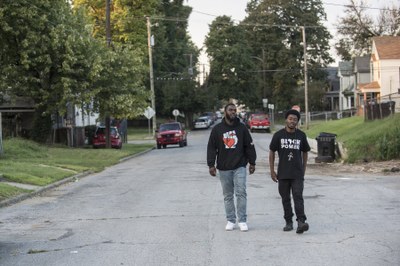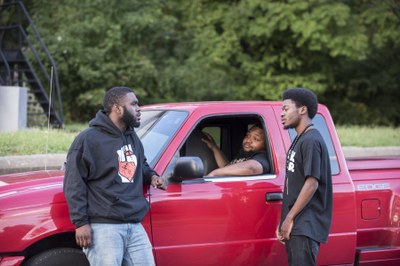SPHIS Home » News » The Power of Truth
The Power of Truth
TreyVon Neely, Youth Violence Prevention Research Center fellow
TreyVon Neely knows what people see when West Louisville is described in the media: violence, inequality, crime, poverty.
The 23-year-old was born and raised in the California neighborhood. Yes, he has seen friends and family affected by violence. Yes, he and people close to him have had run-ins with the judicial system.
But Neely sees something else in West Louisville. Something he considers much more important and true to his experience.
He sees his childhood. He sees a place where neighbors stop their cars on the corner just to say hello. He sees, at its core, a community filled with strong, resilient residents.
“This is home,” he said.
Neely is one of several West Louisville youth fellows working with the University of Louisville’s School of Public Health and Information Sciences (SPHIS) to rewrite the narrative of how West Louisville neighborhoods, residents and, specifically, youth are viewed. By combining academic research with grassroots community action, UofL’s Youth Violence Prevention Research Center (YVPRC), aims to reduce youth violence by helping young people understand the context associated with the conditions in which they live, and to provide them with the tools they need to lead the community toward transformation.
“It’s really personal for me to make a change,” Neely said, with a look of quiet resolve.
 Pride, Peace, Prevention
Pride, Peace, Prevention
The YVPRC was established in 2015 with a five-year, $5.7 million grant from the Centers for Disease Control and Prevention (CDC), and is a National Center of Excellence in Youth Violence Prevention. It is one of only seven Centers of Excellence in the country dedicated to curbing youth violence.
“At the end of the day, our young people are returning to very toxic situations that cause them to make daily decisions about what they are going to do. For some, it’s not because they don’t know better but sometimes they don’t have a choice,” said Monique Ingram, director of the center. “Ultimately we want to change the social conditions and create environments where violence is not the first resort.”
Changing social conditions requires a thorough understanding of how those conditions came to be. That’s why another goal of the YVPRC’s efforts is to counter and shift the dominant narrative surrounding what it means to be an African American in the United States, a narrative borne from injustice and inaccurate portrayals of history.
“Historical patterns of racial discrimination, inequality and lack of economic opportunity have helped foster beliefs that promote and condone violence,” said Monica Wendel, principal investigator of the CDC grant. “When a distinct portion of the population systematically does not receive justice from the institutions of society, they begin to believe that the only justice they receive is justice they exact themselves.”
The YVPRC faculty and staff brought years of behavioral research to the table. But to truly affect change in West Louisville, they couldn’t rely on research alone. They needed the expertise of the community. In this case, many of the experts were teenagers.
The center chose a cohort of eight young people between the ages of 16 and 24 from West Louisville to be Youth Violence Prevention Fellows. The fellows, along with YVPRC and community partners, are designing and implementing a three-year social-norming campaign targeted at getting their peers to change long-held behaviors, and boost pride in their community and their culture.
“Science tells us that social norms affect individual behavior,” Wendel said. “If we think people who are like us act a certain way or expect us to act a certain way in a specific situation, we’re more likely to act that way — whether we agree with it or not.
“But sometimes, our perceptions of those norms are inaccurate,” she added. “Media often make things worse by only portraying negative images and narratives of minority populations, while the positive images of the population remain unseen.”
The social-norming campaign, called “Pride, Peace, Prevention,” launched in spring 2017 and uses social media, television and radio ads, bus shelter signs and billboards to connect youth with positive messages and imagery relative to African Americans. The fellows also use local community events, like block parties and the Dirt Bowl, an annual West Louisville basketball tournament, as opportunities to engage the community in conversation.
“We couldn’t do this without the fellows,” Wendel said. “We want to equip them and empower them to see they can rally people for change.”
Putting it in perspective
Before the fellows could share the campaign message with their peers they needed to build pride in themselves by gaining a more accurate understanding of their race and culture. They participated in sessions to raise their critical consciousness, including those that connected historical facts with current context and taught them how to dispel myths surrounding what it means to be an African American youth. 
The fellows spent hours researching African and world history, learning about an African heritage that reveals a lineage of royal families, kingdoms and empires, and developments and contributions to the fields of medicine, science and technology. They immersed themselves in stories that history books often gloss over, including how African Americans contributed to building the infrastructure and economic capital of the United States through slave labor.
They grew their understanding of modern-day African American hidden figures, coupled with a once-in-a-lifetime experience to take part in the dedication ceremony of the Smithsonian National Museum for African American History and Culture, and be among the first to encounter hands-on exhibits about the fight against racial injustice throughout American history.
It was important for the fellows to understand the history of policies and practices, such as racial segregation and redlining, that resulted in West Louisville looking the way it does and its residents experiencing the struggles they experience, Ingram said.
“A person doesn’t wake up and say ‘I want to kill someone and go to jail’,” said 17-year-old Jailen Leavell, one of the fellows.
“History is our playbook,” said another fellow, Elijah Thomas, 19. “It’s very key in regards to progression on all fronts. It helps us get down to the root of what facilitates our destruction.”
The imagery for the Pride, Peace, Prevention campaign shows the fellows recreating African American leaders who changed history, including Rosa Parks, Thurgood Marshall, Tommie Smith and others. Thomas, for example, portrays Smith in one ad, while Leavell replicates one of Muhammad Ali’s famous poses in another. Imitating these heroes inspired the fellows.
“It helped me gain a sense of self-knowledge,” Thomas said.
Personal growth is critical to the YVPRC mission. “In addition to cultivating a positive racial identity, growing youth in the areas of leadership, advocacy and activism is another important role of the YVPRC,” Ingram said. “We hope to give them a space to develop what they already have within themselves and build capacity to bring lasting change to communities.
Vision for change
After learning the history of his neighborhood and his culture, Thomas began to examine his own past. He admitted to using violence as retaliation after bullies taunted him; it even got him expelled from his high school.
“I ended up responding the only way I knew how, which was violence,” he said.
Thomas, who later earned his GED and has attended classes at Jefferson Community and Technical College, said his time with the YVPRC has helped him think more critically about how he responds to provocation, and how he can affect change in himself and his community.
“Change is incremental, it doesn’t happen overnight,” he said. “We are at least looking into what can be done and formulating action strategies.”
One of the action strategies is to have the fellows work with YVPRC partners, including the Louisville Metro Office of Safe and Healthy Neighborhoods and Jefferson County Public Schools, to creatively express their own ideas for furthering the potential impact and application of the Pride, Peace, Prevention campaign.
For example, Leavell began a Black Student Union at his high school, with the goal of educating his peers about African American history, racial issues and social justice. Meetings included discussions with African American community leaders such as Attica Scott, a Kentucky Congresswoman and former Louisville Metro Council Representative, and Kevin Cosby, president of Simmons College and senior pastor of St. Stephen Church.
Leavell, who completed his YVPRC fellowship this summer, is now a broadcast major at Tennessee State University. He hopes to launch a campus television show there that tackles racial and social justice issues. Before his experience with YVPRC he did not understand how historic practices and certain legislation could contribute to poverty and violence, he said. Now, he feels it is his responsibility to inform others.
“Working at the YVPRC was one of the best experiences of my life,” Leavell said. “Knowing your history is a start to changing the future.”
Implementing the message
The YVPRC plans to hire a second cohort of youth fellows to work with researchers such as Aishia Brown, a postdoctoral associate at SPHIS with expertise in social justice youth development. Brown has assisted YVPRC leadership in developing curriculum and future training opportunities that focus on youth leadership and youth community organizing.
In two years, a third cohort will assess the effectiveness of the campaign, comparing the results to the community of East Nashville, Tennessee, which serves as the control site for the project under the leadership of Maury Nation, associate professor at Vanderbilt University Peabody College of Education and Human Development. Ideally, the campaign will have contributed to lowering incidents of youth violence in Louisville.
Working with the YVPRC provides a sense of hope that change is possible, Neely and Thomas said. “If you can just touch one person, it sets off a domino effect in the community,” said Thomas.
Still, they temper their optimism with reality.
“Survival sets precedence, so it’s hard to receive that message [of potential change] when you’re focused on other things, like having food to eat,” Thomas said.
Neely acknowledges that the YVPRC faces an uphill battle in adjusting perceptions.
“These ills and problems can’t be fixed with programs alone,” he said. “For me, it’s trying to navigate these systems. I’m going to try to do what everyone says I can’t do.”
Neely, who now works for the Office of Safe and Healthy Neighborhoods and plans to resume classes at UofL, will continue as a YVPRC youth fellow for another year so he can keep shifting West Louisville’s story and sharing with other young people what he has learned.
“I am trying to reach out and pull others through the door,” he said. “I want to open their eyes to understanding their identity and being proud of who they are.”
This article first appeared in the fall 2017 edition of UofL Magazine.






